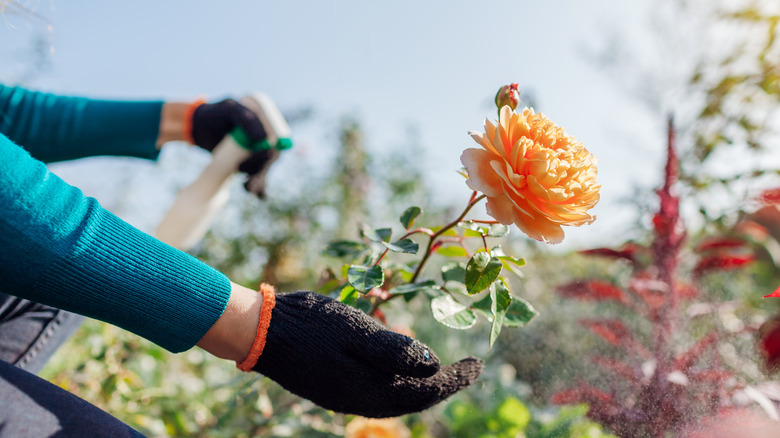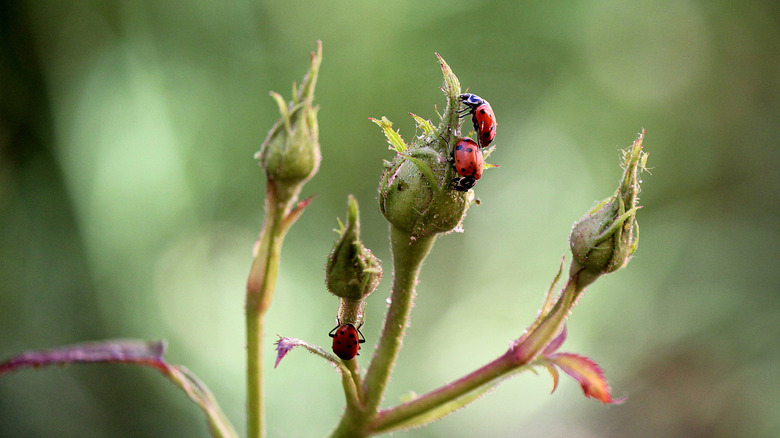What To Do If Spider Mites Are Snacking On Your Roses
Roses stand as perennial favorites in gardens worldwide. Known for their timeless beauty and captivating fragrance, these resilient and versatile plants come in various colors, shapes, and sizes, making them a staple for garden enthusiasts. However, amidst the allure of cultivating roses lies the persistent challenge of spider mites, tiny arachnids capable of wreaking havoc on these cherished blooms. To combat spider mite infestations, rose enthusiasts have found success through the introduction of predatory insects, the application of a soap and water spray, and the use of neem oil.
Spider mites are particularly fond of snacking on the succulent foliage and tender buds of roses. These microscopic pests, belonging to the arachnid family, feast on plant sap, leaving a trail of damage in their wake. A spider mite infestation manifests as stippling, discoloration, the presence of fine webbing, and eventually, weakened plants with stunted growth. Identifying and addressing these nuisances promptly is crucial to preserving the vitality of your rose garden.
Solutions to spider mite infestations on roses
Battling spider mites on roses involves deploying predatory insects. Predatory mites, ladybugs, and lacewings, for example, are formidable allies in the fight against these tiny terrors. They voraciously consume spider mites, providing a natural and sustainable solution to infestations.
A mixture of plain liquid dish soap and water also serves as an accessible and eco-friendly remedy. When sprayed onto the affected rose plants, this solution disrupts the mites' cell membranes, effectively eliminating them. Regular applications, especially on the underside of leaves, can help control and prevent infestations.
You may also consider using neem oil which contains compounds that disrupt the lifecycle of spider mites while being relatively safe for plants, humans, and beneficial insects. High-quality, pure 100% cold-pressed neem oil made for gardening works best. Dilute the neem oil according to the instructions on the product label. Add a small amount of mild liquid soap (like insecticidal soap or dish soap) to help emulsify the oil and enhance its effectiveness. Mix well and transfer to a spray bottle. Apply the solution at dusk or early in the morning to affected rose plants, focusing on the undersides of leaves where spider mites usually congregate. For optimal results, ensure thorough coverage and repeat the oil application every couple of weeks, or as directed on the product label. This helps break the spider mite lifecycle and prevents new generations from emerging. Always follow safety precautions like wearing protective clothing to avoid skin and eye contact.
Preventing spider mite infestations on roses
Including the use of soap and water or neem oil solutions in an overall integrated pest management (IPM) strategy is an effective way to prevent or control spider mite infestations. This may include the introduction of predatory insects, proper watering practices, and maintaining a healthy garden environment.
Encourage natural spider mite predators to live in your garden by cultivating companion plants like yarrow, garlic, and thyme that attract beneficial insects. Adequate spacing between roses enhances air circulation and can help reduce the spread of mite infestations. Also, practice proper watering — keeping the soil consistently moist discourages spider mites, as they thrive in dry conditions. Preventing spider mite infestations also requires vigilant care. Regularly inspect the undersides of leaves for early signs of mites or their webbing, and prune infested foliage. Maintain a healthy garden environment by avoiding over-fertilization, as lush, nitrogen-rich foliage is more attractive to spider mites.
By incorporating these preventive measures and deploying targeted solutions, you can safeguard your rose garden from the relentless threat of spider mite infestations, ensuring your roses flourish in all their glory.


